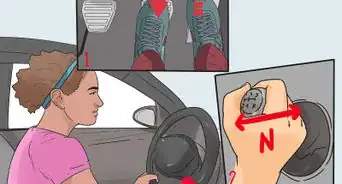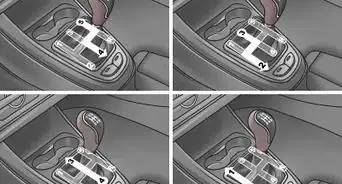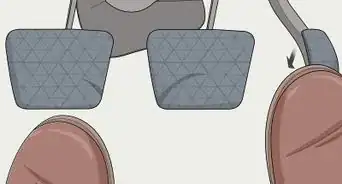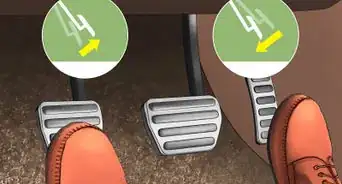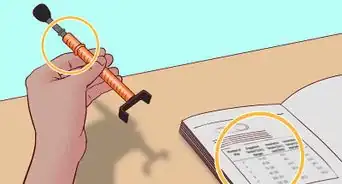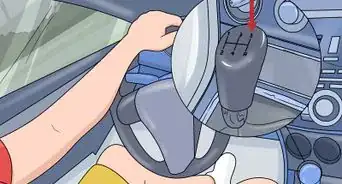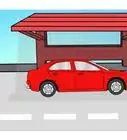X
wikiHow is a “wiki,” similar to Wikipedia, which means that many of our articles are co-written by multiple authors. To create this article, 27 people, some anonymous, worked to edit and improve it over time.
This article has been viewed 238,422 times.
Learn more...
As the price of fuel rises higher, many wish to know how to get the most bang for their buck while at the fuel pumps. This wikiHow will cover how to get the best mileage out of a Diesel-engined vehicle.
Steps
-
1Choose the right gas station to trial and stick with it for duration of the steps below. Not all diesel fuels are equal quality. Some are "dirtier" than others, and will negatively affect your mileage. Switching stations usually means switching the specific type of diesel fuel, so stay consistent. Find a gas station that offers a low price on diesel fuel, and also offers self service diesel pumps. Some stations offer further discounts if you pay with cash or debit. Your car dealership should be able to recommend a gas station that is best for your car.
-
2Ensure that your vehicle's engine has been serviced and that all glow-plugs are operating efficiently. Inefficient functioning of your glow-plugs means inefficient engine starts, which wastes fuel.Advertisement
-
3Inquire at your car dealership about fuel additive for your diesel engine. Many will increase your mileage while helping keep your engine clean. Factor the cost of this additive, and how often you are expected to add it, onto the cost of your fuel.[1]
-
4When you go to the pumps, try your best to always fill your car all the way up. It will make measuring your trial much easier.
-
5Reset your vehicle's "Trip" odometer whenever you fill up.
-
6Pay attention to your gas-cap warnings. For example, many diesel vehicles have a "DO NOT TOP OFF" warning written on them. If present, heed this warning and communicate it to gas station attendants filling your vehicle.
-
7When starting your vehicle, always make sure your glow plug indicator is indicating that it is ready for ignition. This usually means that your glow-plug light is no longer illuminated. Turning the ignition before your glow plug is ready may waste fuel. During some colder weather, some car dealerships recommend that you "double glow" to get the glow plug hotter. This consists of glowing your plug, and when it indicates "ready", turning off your ignition, and repeating the glow again before turning your ignition. This may allow for a more efficient start in some vehicles at certain low temperatures. Besides, glowing your plugs consumes no fuel, so there is no disadvantage.[2]
-
8Driving style makes all the difference with fuel economy, whether it is in diesel or gas cars. This is the single biggest change you can make to see dramatic improvements in your fuel economy. If optimal fuel economy is your goal, be ready to sacrifice any aggressive or "performance" driving habits you may have.[3]
-
9Each engine has a "sweet spot" where it is operating at its most efficient. These are normally "highway speeds" somewhere around 60 mph (100 kph) in 5th gear but it will vary from car to car. Accelerating to that habitual "20% over the speed limit" will negatively impact your fuel consumption considerably.
-
10If you have cruise control in your vehicle, use it regularly so that you don't subconsciously "creep" your speed upwards. Your on board computer is better at efficiently maintaining speed than you are. Humans tend to "over correct" by accelerating a little too much, braking or decelerating, applying the gas pedal again, etc. This wastes fuel, a little at a time.[4]
-
11When driving, gear up as soon as you can. Get into the habit of spending the least amount of time possible in the lower gears. Conversely, gear down (or speed up) whenever you hear your car struggling in a high gear. You should not feel a strain on your transmission, but most people tend to wrongly delay their shifting to higher gears by several hundred RPM. You will feel a slight decline in your acceleration when you shift sooner, but once again, try hard to shed any addiction to power, speed, and acceleration. Those things are incompatible with optimizing fuel mileage. Try hard to retrain yourself to the new shift-times.[5]
-
12Your fuel mileage will realize large efficiencies the more you drive uninterrupted. A "road trip" on the highway is the ideal case since you can maintain a relatively steady speed, not be idling at stop signs/lights very often, and not be restarting your vehicle too often. With any other type of trip (to work, to a friends, etc.) stay on highways for as long as you can.
-
13Engine braking (gear down) to slow or stop, in modern diesel engines uses less fuel than just braking, or coasting to a stop either in neutral or by holding the clutch down. This is because modern diesels have direct injection which is computer controlled. At idle, the injectors are delivering a very small amount if fuel. When you use the engine to slow the vehicle at speed (throttle closed), the injectors shut off. While the engine braking (gearing down) method of stopping is easier on your brakes, it is harder on the clutch. Brakes cost less than clutches do, so it depends on the situation for what the better choice is.
-
14Many drivers forget that every electrical convenience being operated consumes fuel. Try to keep defrost, seat warmers, radio, fans, etc at a minimum. Turn off your full lights during the daytime and let your daytime running lights do the rest. Also, many defrost options will not turn off automatically, so monitor them diligently. Air conditioning is the worst fuel-consumer. Use it sparingly if you wish to conserve fuel. Turning the windows down also wastes fuel, although some people argue whether or not it wastes more or less than air conditioning, and this fact varies at different speeds. The fact is, any time air is being removed from the passenger cabin through an opening, it is creating some degree of drag from an aerodynamic standpoint, however small. Simply be aware of it. Also, while your engine is turned off, limit electrical convenience use (radio etc) since the car will have to recharge the battery accordingly after it starts.
-
15Some dealerships offer "chips" for your onboard computer that upgrade your vehicles fuel economy. Many people purchase these expensive chips without factoring in their cost. These chips should be viewed as an investment. Armed with numbers of your regular fuel consumption, average speeds, etc, you should calculate how long it will take the chip to pay for itself. Some discover that it is longer than they plan to own the vehicle, making it a foolish purchase for them. Make the right financial choice for yourself, since saving money on fuel consumption is what it's all about.
-
16When you finally empty your tank, note your "Trip" odometer reading. This should act as your "score" of how many miles/kilometers you managed to get out of your vehicle on that tank. Also note the amount of fuel you used to fill your tank in gallons. Miles / gallons = MPG. Beating this score becomes the goal by experimenting with different driving patterns, speeds, routes, fuel, additives, etc. Just remember to make small changes, one at a time, or else you will never know what is working for or against you.[6]
Advertisement
Community Q&A
-
QuestionHow often do I have to give my CitroenDS3 1.6 diesel a good run?
 Community AnswerEvery week or so take your car onto the motorway and drive for a good 20-30 minutes to allow the fuel filter to clean itself.
Community AnswerEvery week or so take your car onto the motorway and drive for a good 20-30 minutes to allow the fuel filter to clean itself. -
QuestionWhat should RPM be at 30 MPH in 3rd gear in a 1.6 turbo diesel?
 Community AnswerIt depends upon the gear ratio of your specific vehicle, but usually it is around 1600.
Community AnswerIt depends upon the gear ratio of your specific vehicle, but usually it is around 1600.
Advertisement
Warnings
- Always make sure you never empty your tank on a diesel car completely. If you run out of diesel, the engine has to be de-aerated on most diesel cars.⧼thumbs_response⧽
Advertisement
References
- ↑ https://www.dieselnet.com/tech/fuel_diesel_additives.php
- ↑ https://www.military.com/off-duty/autos/getting-diesel-engines-started-on-a-frosty-morning.html
- ↑ https://www.fueleconomy.gov/feg/driveHabits.jsp
- ↑ https://learn.eartheasy.com/guides/fuel-efficient-driving/
- ↑ https://www.drive-safely.net/gas-economy/
- ↑ https://learn.eartheasy.com/guides/how-to-calculate-gas-mileage/
About This Article
Advertisement

